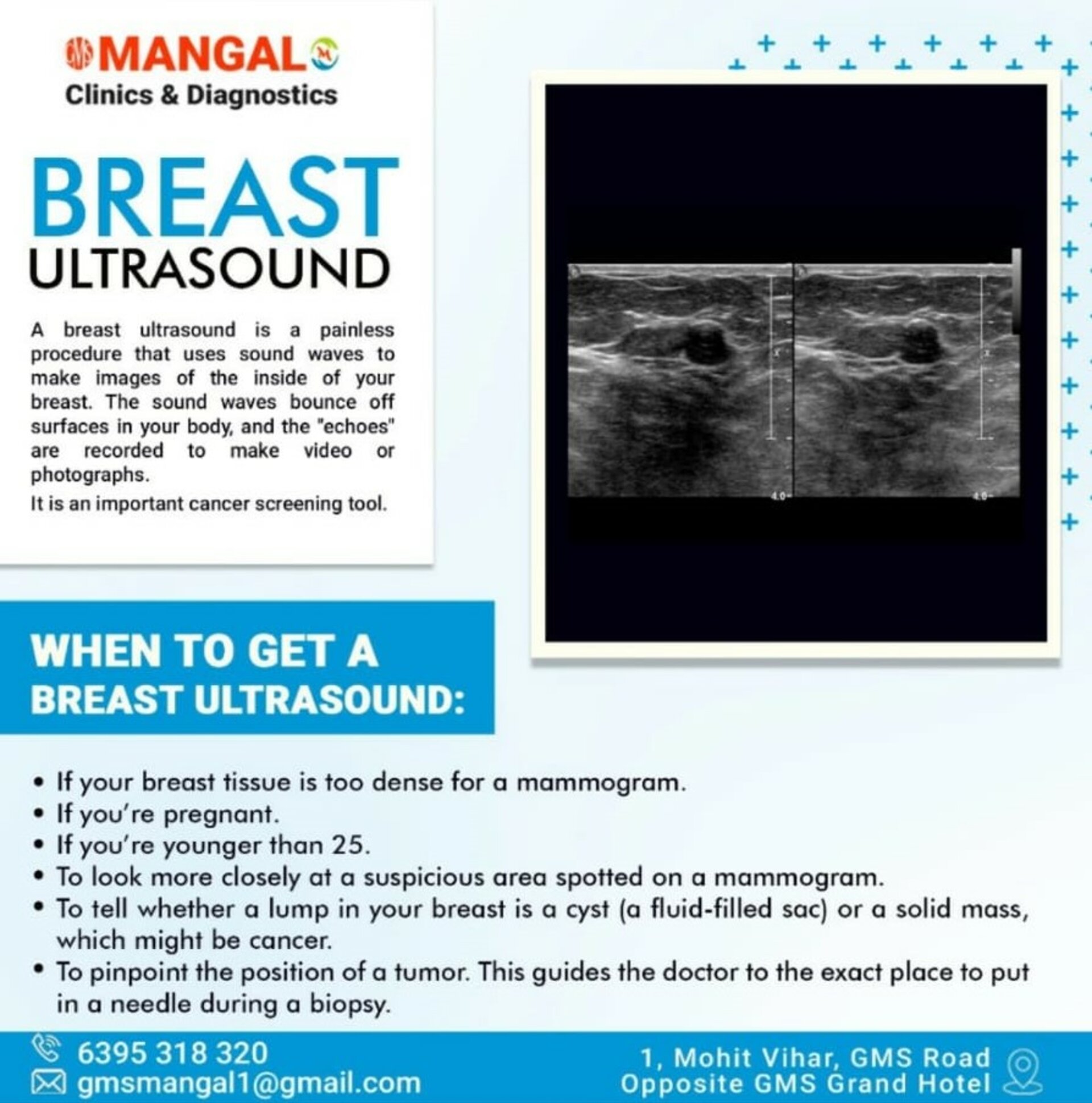Breast health is a critical aspect of overall well-being, and early detection of abnormalities can save lives. A breast ultrasound is a non-invasive, painless imaging technique that helps diagnose various breast conditions, including cysts, tumors, and other abnormalities. It plays a vital role in breast cancer screening and diagnosis, especially for women with dense breast tissue or other specific conditions.
At MANGAL Clinics & Diagnostics, Dehradun, we offer high-quality breast ultrasound services to ensure accurate and early detection of breast-related concerns.
What is a Breast Ultrasound?
A breast ultrasound is a diagnostic imaging procedure that uses high-frequency sound waves to create detailed images of the internal structures of the breast. These sound waves bounce off breast tissues and return as echoes, which are then converted into real-time images. Unlike mammograms, which use X-rays, ultrasound does not expose the patient to radiation, making it safe for all age groups.
Why is Breast Ultrasound Important?
Breast ultrasound is an essential tool for detecting and diagnosing breast conditions, particularly in cases where mammograms may not provide a clear picture. It helps:
- Detect breast lumps and differentiate between solid masses and fluid-filled cysts
- Evaluate abnormalities found on a mammogram
- Guide doctors during a breast biopsy
- Assess changes in breast tissue, especially in young or pregnant women
Breast ultrasound is often used alongside mammography for a more comprehensive evaluation of breast health.
When Should You Get a Breast Ultrasound?
Your doctor may recommend a breast ultrasound in the following situations:
- If You Have Dense Breast Tissue: Dense breast tissue makes it difficult for mammograms to detect abnormalities. Ultrasound provides a clearer view and helps identify potential tumors that might be missed on a mammogram.
- If You Are Pregnant: Mammograms use radiation, which can be harmful during pregnancy. Breast ultrasound is a safe alternative for diagnosing breast lumps or other concerns in pregnant women.
- If You Are Under 25 Years Old: Younger women often have denser breast tissue, making mammograms less effective. Ultrasound is the preferred diagnostic tool in these cases.
- To Further Investigate a Suspicious Area Found on a Mammogram: If a mammogram detects an abnormal area, an ultrasound can help provide more details and determine if further tests or a biopsy are needed.
- To Differentiate Between a Cyst and a Tumor: A breast ultrasound can determine whether a lump in the breast is a cyst (fluid-filled sac) or a solid mass, which might be cancerous.
- For Biopsy Guidance: If a biopsy is required, an ultrasound helps guide the needle to the exact location of the abnormal tissue, ensuring a precise sample is taken for examination.
What to Expect During a Breast Ultrasound?
A breast ultrasound is a simple, quick, and painless procedure that usually takes 15-30 minutes. Here’s what you can expect:
- You will be asked to lie on your back with your arm raised above your head.
- A special gel is applied to the skin to help the ultrasound waves travel more efficiently.
- The radiologist or technician will move a handheld device (transducer) over your breast to capture images.
- You may be asked to change positions slightly for better imaging angles.
- Once the imaging is complete, the gel is wiped off, and you can resume normal activities immediately.
Is Breast Ultrasound Safe?
Yes, breast ultrasound is completely safe. It does not use radiation, making it a preferred choice for young women, pregnant women, and frequent screenings. There are no known side effects, and it can be performed multiple times without risk.
Understanding Your Breast Ultrasound Results
Once the scan is complete, Dr. Deepti Agarwal will review the images and interpret the results. Possible findings include:
- Normal Breast Tissue – No abnormalities detected.
- Cysts – Fluid-filled sacs that are usually benign (non-cancerous).
- Fibroadenomas – Non-cancerous solid tumors.
- Suspicious Lumps – May require a biopsy for further evaluation.
- Signs of Breast Cancer – Further tests such as MRI or biopsy may be needed.
If any abnormality is found, Dr. Deepti Agarwal will discuss the next steps and guide you through additional tests or treatments if required. 